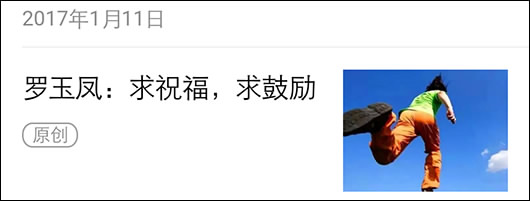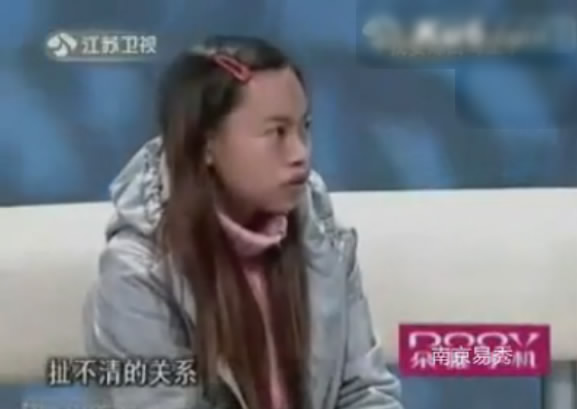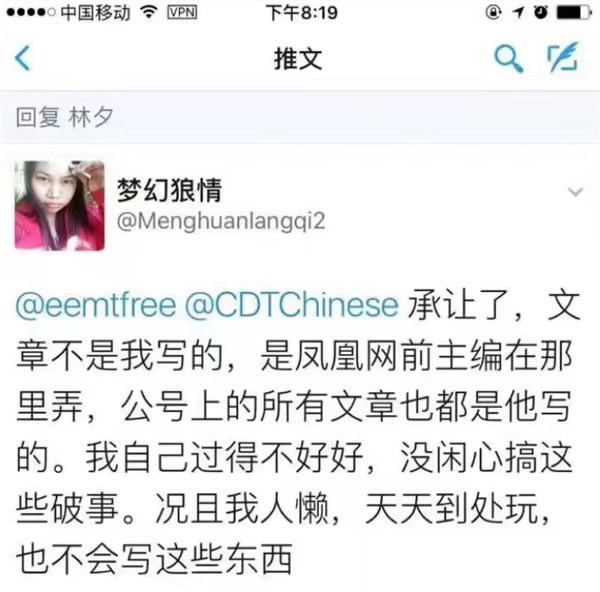A reality star dubbed “the most hated woman in China” by the New York Post has encountered new controversy – just as netizens had started to give her a second chance. Fengtopia, the public social media account of Chinese reality star Luo Yufeng – widely known as Sister Feng - was shut down on Sunday evening amid growing questions about whether the posts had been crafted by ghostwriters. A few days earlier, Yufeng had returned to the spotlight with a revealing article reviewing her legendary journey from obscurity to infamy.

An autobiographical article written by Luo Yufeng went viral. /WeChat Screenshot
"I ask myself again and again, was I insane? No, it's just that I wanted to control my fate," said Sister Feng in the post read several million times on WeChat. Born into an poor family, she used to assume that she could equal the city-born kids if she worked harder to get better grades in school; that she would be rewarded with real friends and love if she cultivated herself with a passion for poetry; that she would find her way to a better life if she struggled to survive in China's richest metropolis. "Again and again, I was taught lessons by reality,” the article read.

Luo Yufeng featured in a TV reality show in 2010. / Jiangsu TV Screenshot
In 2009, Luo Yufeng made headlines by handing out fliers in Shanghai in her hunt for a Mr. Right with a list of extreme demands. She later appeared in a TV reality show, which portrayed her as a shameless gold digger. That image triggered a flood of mockery on Chinese social media, but gained her 1.4 million followers on Weibo. "To be honest, I was secretly enjoying it, because I believed that I would deserve people’s respect if I earned something that they don’t possess,” she confessed. However, fame came with humiliation. “Kicked out by the school where I taught, blocked by other family members, insulted by strangers in the street”, she left China for the US in 2010. “I wanted to succeed in the most advanced country in the world to prove that it’s you who are wrong,” she apparently wrote.
Sister Feng kept a low profile for several years, working as a manicurist in New York. But in 2015 she returned to the spotlight with a column on Hong Kong-based news website Ifeng.com. In 2016, she started a blog on WeChat, commenting on hot issues in China. That’s where the latest autobiographical article went viral, with more than three million reads in a few days and changing attitudes. Many netizens expressed regret at previously ridiculing her on discovering a real conscience behind her story. “She has the guts to embrace the world after having witnessed its ugliest side, that’s why I admire her,” one comment read.

A recent selfie of Luo Yufeng. /Weibo
However, three days later, Sister Feng unexpectedly announced she wanted to retract the article, saying a part describing her as someone eager to acquire a US green card was added by an editor without her approval. The statement aroused suspicions: did she write the article herself or was it the work of a ghostwriter?
On Saturday, Ifeng.com released an official announcement saying its cooperation with “the team of Luo Yufeng” had been halted in September 2016. In the meantime, an unidentified Twitter post allegedly belonging to Sister Feng spread on Weibo, “admitting” that all her WeChat posts were written by a former Ifeng chief editor. “My life is a mess. No spare time for that useless stuff,” it read. Later, a lanjingtmt.com report pointed out that Sister Feng’s WeChat account was registered under the name of a Mr. Miu, with the same surname of Miu Fen, former Ifeng chief editor. He was fired by Ifeng in August 2016 for “unethical professional conduct”, according to an official announcement.

A tweet allegedly posted by Luo Yufeng spread quickly on Chinese social media. /Twitter
On Sunday, an Ifeng columnist who helped to polish Sister Feng’s articles said the star was unlikely to have a ghostwriter while working for Ifeng, but couldn’t make that guarantee for her personal blog. He also noted that an editor was assigned to dictate her narration as she became reluctant to write about her experiences. A guancha.cn report investigated the WeChat account under scrutiny, estimating that it could make around 10,000 US dollars per month out of commercial advertisements, with every post read around 10,000 times on average.
Luo Yufeng has denied all the accusations categorically, asserting that she has never owned a Twitter account and has never known a Mr.Miu, and threatened to sue for defamation. In a later Weibo post, she replied to online critics, saying “it’s slimy to spread slanders from behind a monitor. Expose yourself to see who’s cleaner!”
On Sunday evening, WeChat administrators abruptly suspended access to Luo Yufeng’s account. There has been no comment as yet from Tencent, WeChat’s owner.











